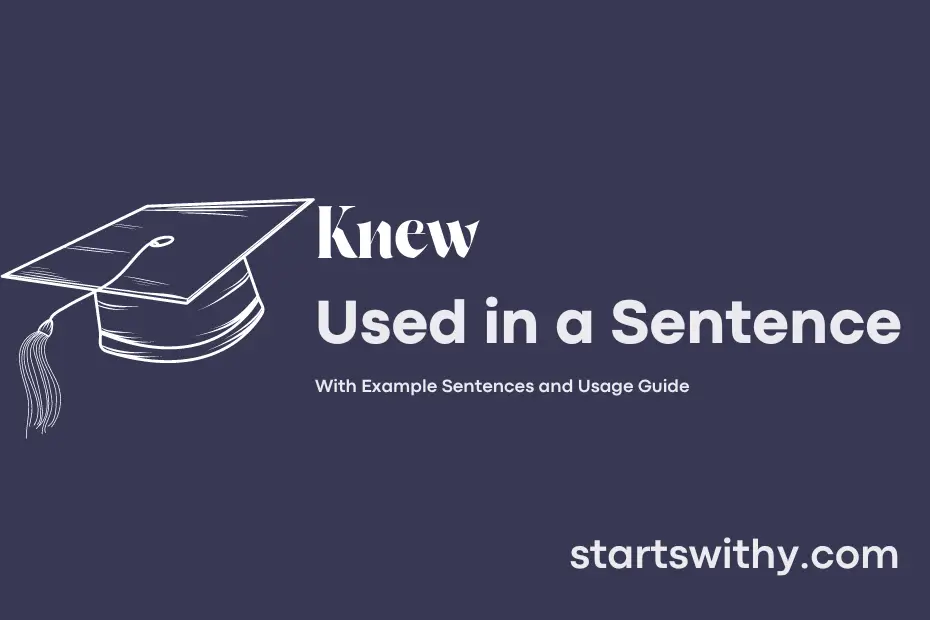Do you ever struggle with using the word “knew” correctly in a sentence? Understanding when to utilize this past tense form of “know” can be perplexing for many. “Knew” is the past tense of “know” and is commonly used to indicate that someone had knowledge of something in the past.
To provide clarity, consider the context in which you are using “knew” and ensure that it is referring to a previous point in time. Whether you are narrating a story, recounting an experience, or expressing a past belief, using “knew” accurately will enhance the clarity and coherence of your writing.
7 Examples Of Knew Used In a Sentence For Kids
- I knew my ABCs before going to school.
- She knew how to tie her shoes all by herself.
- We knew the colors of the Indian flag.
- They knew how to count from 1 to 10.
- He knew the names of all the animals in the zoo.
- The teacher knew a fun story to read to the class.
- The little boy knew where to find his favorite toy.
14 Sentences with Knew Examples
- During the exam, she suddenly knew the answer to a difficult question.
- He thought he knew all about the subject until he attended the lecture and realized he was mistaken.
- The professor was impressed when a student showcased knowledge in a topic no one else knew about.
- Despite attending several lectures, she never knew about the upcoming assignment deadline.
- The group of friends knew they had to collaborate to complete the group project on time.
- The student knew he should have started studying earlier when he saw the midterm exam schedule.
- She confidently knew the correct approach to solve the math problem after revising the concepts.
- The college library was bustling with students researching topics they never knew existed.
- He knew he had to improve his time management skills to balance academics and extracurricular activities.
- The workshop helped students gain insights into a field they never knew they would be interested in.
- She knew she had to seek help from seniors to understand the complex lab experiment procedure.
- The guest speaker’s insightful presentation challenged what the students knew about the industry.
- The final year student knew that networking with alumni could open up job opportunities post-graduation.
- The professor was pleased to see students actively participate in discussions, sharing perspectives they never knew existed.
How To Use Knew in Sentences?
To use the word “Knew” correctly in a sentence, follow these steps:
-
Understanding the meaning: Knew is the past tense of the verb “know.” It is used when referring to something that was understood or realized in the past.
-
Subject-Verb Agreement: Make sure the subject of your sentence agrees with the past tense form of the verb. For example, “She knew the answer” or “They knew the truth.”
-
Context: Consider the context in which you are using the word. Does it make sense chronologically in relation to other events in the sentence?
-
Tense: Since knew is the past tense form of “know,” it should be used when referring to the past. For example, “He knew the result before anyone else did.”
-
Practice: It can be helpful to practice using knew in different sentences to ensure you are using it correctly.
-
Grammatical Structure: Consider the grammatical structure of your sentence. Knew is typically followed by a direct object. For example, “She knew the truth” or “They knew his name.”
By following these steps, you can effectively incorporate the word “Knew” into your sentences. Remember to pay attention to subject-verb agreement, tense, and the context in which the word is being used.
Conclusion
In conclusion, the sentences provided with the keyword “knew” demonstrate different contexts in which the verb can be used. From expressing past knowledge and awareness to highlighting a sudden realization, the examples showcase the versatility of this word in conveying various thoughts and emotions. Whether it’s acknowledging a piece of information or reflecting on a personal experience, the usage of “knew” adds depth and clarity to the meaning of each sentence.
By examining these examples, it is evident that “knew” plays a crucial role in shaping our understanding of past events and present circumstances. Its presence in sentences helps to establish a timeline of events, show character development, and provide insight into the speaker’s perspective. Overall, the diverse range of sentences containing “knew” underscores the importance of this word in effective communication and storytelling.



